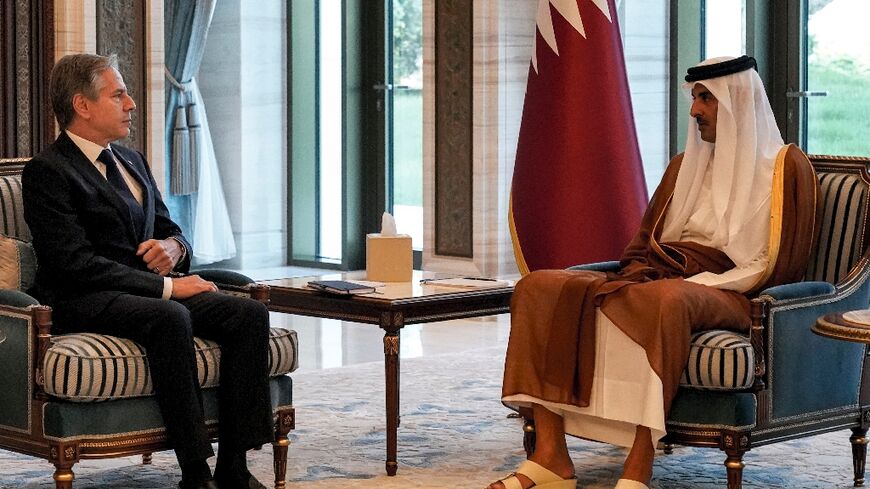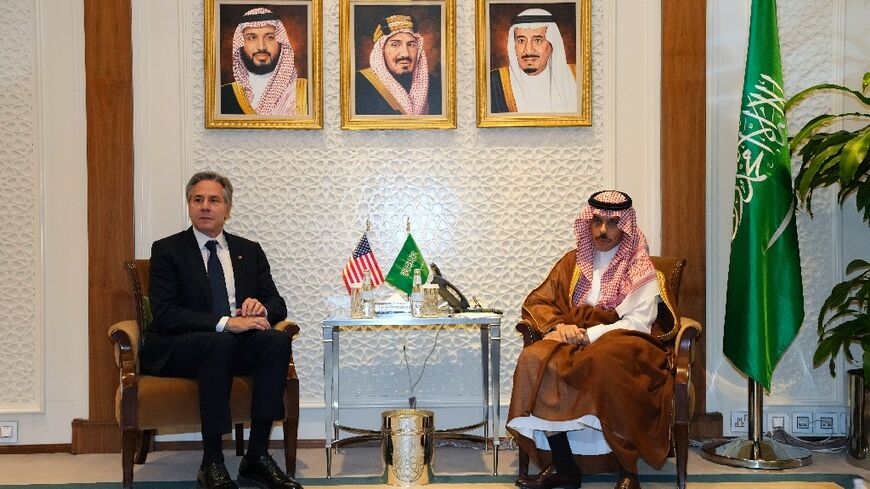Blinken asks Israel to spare Gaza civilians during Arab tour
US Secretary of State Antony Blinken called Friday on Israel to limit Palestinian civilian deaths as he worked to set up safe areas in the Gaza Strip, seeking to keep calm in the Arab world following a major Hamas attack.
After a solidarity visit to Tel Aviv, Blinken, on a six-nation tour of the Arab world, again defended Israel's right to respond but also stepped up the tone on protecting innocent Palestinians.
"We have urged the Israelis to use every possible precaution to avoid harm to civilians," Blinken told a news conference in Qatar.
"We recognise many Palestinian families in Gaza are suffering through no fault of their own and that Palestinian civilians have lost their lives," he said.
But he said that Israel was within its rights after the "unconscionable" attacks by Hamas.
"What Israel is doing is not retaliation. What Israel is doing is defending the lives of its people," he said.
"Any country, faced with what Israel has suffered, would likely do the same thing."
Blinken praised Qatar, which has longstanding relations with Hamas, for showing "urgency" in efforts to persuade the militants to free an estimated 150 hostages.
As anger swells around the Arab world, Blinken also discussed ways to protect civilians in Hamas-controlled Gaza where Israel called Friday on more than one million people to evacuate ahead of an expected ground invasion.
The Israeli military confirmed Friday that ground forces had already made raids into Gaza over the past 24 hours.
A US official said Israel agreed with Blinken in the talks in Tel Aviv on "the need to establish some safe areas where civilians could relocate, be safe from Israel's legitimate security operations".
"The Israelis are committed to it," the US official told reporters on condition of anonymity on Blinken's plane.
Hamas militants on October 7 shocked Israel by breaching its southern border and killing more than 1,300 people, including children, the elderly and revellers at a music festival.
Even before an expected ground operation, Israel has killed at least 1,799 people in relentless strikes on the Gaza Strip since the Hamas attack, and has cut off food, water and electricity.
In Washington, National Security Council spokesman John Kirby acknowledged that evacuating 1.1 million people would be "a tall order".
US officials also appeared to backtrack on earlier efforts to let Gazans flee to adjacent Egypt, saying they did not see wide support and instead wanted safe areas within Gaza.
Instead, the United States is working with both Egypt and Israel to let Americans and other foreign nationals leave through the Rafah border crossing, the US official said.
- Concerns from Jordan -
Blinken opened the day consulting in Amman with King Abdullah II as well as Palestinian president Mahmud Abbas.
The Jordanian king, a longtime US partner, called for "humanitarian corridors" to bring relief into Gaza and de-escalate the situation, a statement from the royal court said.
Abdullah, whose kingdom is home to two million Palestinian refugees, warned against another permanent displacement, this time from Gaza.
"The crisis should not be spread to neighbouring countries and exacerbate the refugee issue," the king told Blinken.
Blinken later headed to Qatar, which has ties with both the United States and Hamas, whose primary foreign backer is Iran's clerical state.
The top US diplomat will later head to Bahrain, Saudi Arabia, the United Arab Emirates and Egypt.
Saudi Arabia in the weeks before the attacks had spoken of progress in US-led diplomacy to normalise relations with Israel -- a landmark step for the conservative kingdom that is guardian of Islam's two holiest sites.
Few expect the momentum to be maintained, with the Saudis joining Qatar in blaming Israeli policies towards the Palestinians for the flare-up in violence.
Blinken also promised to work with the Palestinian Authority and praised Abbas for efforts to maintain calm in the West Bank over the past week.
The nearly 88-year-old Abbas, whose Palestinian Authority enjoys small levels of autonomy in the West Bank, is a sworn foe of Hamas, which seized control of the Gaza Strip in 2007.
But Israeli Prime Minister Benjamin Netanyahu has long sought to sideline the Palestinian Authority and Abbas, saying he is insufficiently committed to stopping violence, with the hard-right Israeli government rejecting the prospect of a two-state solution.





